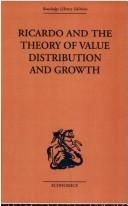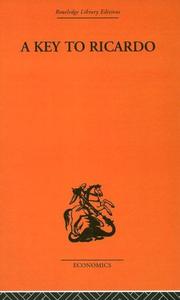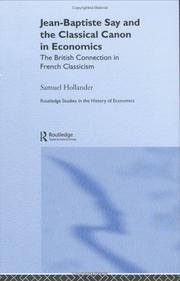| Listing 1 - 8 of 8 |
Sort by
|
Book
ISBN: 1134820151 1280182768 9786610182763 113482016X 0203006496 Year: 1995 Publisher: London ; New York : Routledge,
Abstract | Keywords | Export | Availability | Bookmark
 Loading...
Loading...Choose an application
- Reference Manager
- EndNote
- RefWorks (Direct export to RefWorks)
Samuel Hollander's interpretation of Ricardo has attracted apoplectic responses from both Right and Left. This volume collects together the material needed to evaluate these responses. His basic position - that Ricardo stands in a continuous analytical line leading from Adam Smith to Alfred Marshall - is seen to antagonise both those who argue for a 'marginal revolution' and a sharp divide between classical and neo-classical economics, and those who want to champion Ricardo as a forerunner of Sraffa.
Book
ISBN: 1315168502 135168616X 1351686151 9781351686150 9781315168500 9781315168500 9781351686167 9781351686143 1351686143 9781138122451 1138122459 Year: 2017 Publisher: London Routledge, Taylor & Francis Group
Abstract | Keywords | Export | Availability | Bookmark
 Loading...
Loading...Choose an application
- Reference Manager
- EndNote
- RefWorks (Direct export to RefWorks)
The book's interpretation brings fresh insights into and new developments on the Ricardian international trade theory by examining the true meaning of the 'four magic numbers'. By putting together theories of comparative advantage and international money, the book attempts to elucidate Ricardo's international trade theory in the real world. This book also features contributions from the Japanese perspective, and compares Ricardian theories with those of his contemporaries, such as Malthus, Torrens and J. S. Mill. This book will be a valuable reference for researchers and scholars with interests in the history of economic thought and international economics.
International trade. --- Ricardo, David, --- Economic schools --- Ricardo, David

ISBN: 0203708687 1299480187 1135033382 0415313252 9781135033385 9780203708682 0415607175 9780415607179 9781135033361 1135033366 9781135033378 1135033374 9780415313254 9780415607179 Year: 2003 Publisher: London
Abstract | Keywords | Export | Availability | Bookmark
 Loading...
Loading...Choose an application
- Reference Manager
- EndNote
- RefWorks (Direct export to RefWorks)
The book presents a rigorous reconstruction of Ricardo's contribution to economic theory and a unifying interpretation of the key issues of Ricardo's research. Part One deals primarily with the problems of value and distribution Part Two deals specifically with the issues of distribution and growth. * Contemporary economic literature in the fields of value, distribution and growth is witnessing a renewed interest in the approach of the classical school, notably in the work of David Ricardo.
Business & Economics --- Economic Theory --- Ricardo, David.
Book
ISBN: 0856833177 Year: 2006 Publisher: London : Shepheard-Walwyn,
Abstract | Keywords | Export | Availability | Bookmark
 Loading...
Loading...Choose an application
- Reference Manager
- EndNote
- RefWorks (Direct export to RefWorks)
Presenting insights into how income and wealth are produced and distributed, this study analyzes how, despite two centuries of capital accumulation, poverty persists in rich nations. Relying on the theories of David Ricardoa 19th-century economist credited with developing the theory of renta thorough presentation of the history of this economic law, from the inscriptions on the clay tablets of ancient Babylonian merchants to statistics that portray the modern economy, is provided. Presenting readers with conceptual tools that will motivate them to reengage in the democratic process, this examination dispels the myths of contemporary fiscal policy while providing keen insights into the history, and future, of economics.
Book
ISBN: 1135041806 0203797310 1135041814 Year: 2013 Publisher: Abingdon, Oxon : Routledge,
Abstract | Keywords | Export | Availability | Bookmark
 Loading...
Loading...Choose an application
- Reference Manager
- EndNote
- RefWorks (Direct export to RefWorks)
David Ricardo, one of the major figures in the history of economic thought, particularly in the English classical political economy, deployed his activities as economist just two hundreds of years ago. Since then his economics has been generally estimated as the culminating point of the classical economics, and his name and theory has been exerting an enduring influence up to the present. This book, consisting of articles contributed by historians economic thought on money and finance, intends to reappraise the Ricardo's monetary and financial thought on the occasion of its bicentenary and
Money. --- Monetary policy. --- Finance. --- Ricardo, David,
Book
ISBN: 1135040397 0203783549 1135040400 Year: 2013 Publisher: Abingdon, Oxon ; New York : Routledge,
Abstract | Keywords | Export | Availability | Bookmark
 Loading...
Loading...Choose an application
- Reference Manager
- EndNote
- RefWorks (Direct export to RefWorks)
The essays in this edited collection, first published in 1986, focus on important debates surrounding the central Marxian problem of the transformation of values into prices. The collection brings together major contributions on the value theory debate from the decade prior to the book's publication, and assesses the debate's significance for wider issues. Value theory emerges as much more than a technical relation between labour time and prices, and the structure of the capitalist economy is scrutinised. This is a relevant and comprehensive work, valuable to students, academics and profess
Value --- Value. --- Marxian economics. --- History. --- Sraffa, Piero. --- Ricardo, David,

ISBN: 0415607280 1315888939 1134559399 0415313376 1299998186 9781134559398 9781315888934 9781134559466 9781134559534 9780415313377 9780415607285 1134559461 Year: 2013 Publisher: Hoboken Taylor and Francis
Abstract | Keywords | Export | Availability | Bookmark
 Loading...
Loading...Choose an application
- Reference Manager
- EndNote
- RefWorks (Direct export to RefWorks)
Ricardo is one of the most imposing figures in the history of economic thought, yet at times his writings are among the most obscure. A Key to Ricardo traces, simplifies and clarifies Ricardo's ideas on the principal topics on which he wrote.
The book provides a careful analysis of Ricardo's most cryptic passages and also explores areas where Ricardo appears to be mistaken. Setting Ricardo's writings against the context of his contemporaries, the relevance of the Ricardian contribution to subsequent economic thinking is nonetheless made very clear.

ISBN: 041532338X 0415649447 113435858X 1280150661 0203022289 1134358571 9780415323383 Year: 2005 Volume: 72 Publisher: Taylor & Francis
Abstract | Keywords | Export | Availability | Bookmark
 Loading...
Loading...Choose an application
- Reference Manager
- EndNote
- RefWorks (Direct export to RefWorks)
This book explores the perceived paradigmatic conflict within British classical economics between the so called 'Ricardo School' and the contemporary French Economics of Jean-Baptiste Say. Samuel Hollander provides the reader with extensive evidence, utilizing all editions of Say's main texts and his lesser-known writings in order to demonstrate his adherence to much of Ricardian theory. This intriguing book focuses on selected doctorinal issues and surrounding debates, and will interest all serious historians of economic thought, finding a place on the bookshelves of many economists
Classical school of economics --- Economics --- History --- Say, Jean-Baptiste --- AA / International- internationaal --- 330.44 --- Adam Smith. --- Economic theory --- Political economy --- Social sciences --- Economic man --- Classical economics --- Individualist school of economics --- Orthodox school of economics --- Schools of economics --- Adam Smith --- Ricardo, David, --- Say, Jean Baptiste, --- Rikardo, David, --- Li-chia-tʻu, --- Li-chia-tʻu, Ta-wei, --- Lijiatu, Dawei, --- Influence. --- Influence --- Classical school of economics. --- Economics - France - History - 19th century --- Economics - Great Britain - History - 19th century --- Say, Jean Baptiste, - 1767-1832 --- Ricardo, David, - 1772-1823 - Influence --- cours --- complet --- prix --- falling --- profit --- rate --- mccullochs --- discourse --- les --- sciences --- Ricardo, David, - 1772-1823
| Listing 1 - 8 of 8 |
Sort by
|

 Search
Search Feedback
Feedback About UniCat
About UniCat  Help
Help News
News